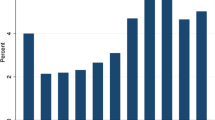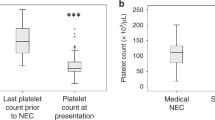Abstract
Objective:
When rectal bleeding occurs in an otherwise asymptomatic child, it can be classified as isolated rectal bleeding (IRB). Among the different etiologies suggested for IRB, one of the most common is a hypersensitivity reaction of the bowel mucosa to digested antigens. The objective of this study was to assess the long-term outcomes and the risk of developing hypersensitivity syndromes among infants following an IRB event.
Study Design:
A historical prospective comparative study was carried out. The study compared 77 infants who were born at the Sheba Medical Center in Israel during the period 2002 to 2009 and who experienced a neonatal IRB event to 77 infants with the same gestational age, but without IRB. Data were obtained from hospital records and from phone interviews with the parents regarding hypersensitivity syndrome between the ages of 3 and 10 years.
Result:
The IRB group was not at an increased risk of developing a hypersensitivity syndrome or gastrointestinal symptoms compared to the control group. Longer duration of breast-feeding was found to be related to a lower incidence of hypersensitivity symptoms.
Conclusion:
An IRB event in the neonatal period does not increase the risk of developing hypersensitivity syndromes or food allergies during childhood.
This is a preview of subscription content, access via your institution
Access options
Subscribe to this journal
Receive 12 print issues and online access
$259.00 per year
only $21.58 per issue
Buy this article
- Purchase on Springer Link
- Instant access to full article PDF
Prices may be subject to local taxes which are calculated during checkout
Similar content being viewed by others
References
Lawrence WW, Wright JL . Causes of rectal bleeding in children. Pediatr Rev 2001; 22: 394–395.
Maayan-Metzger A, Ghanem N, Mazkereth R, Kuint J . Characteristics of neonates with isolated rectal bleeding. Arch Dis Child Fetal Neonatal Ed 2004; 89: 68–70.
Silber G . Lower gastrointestinal bleeding. Pediatr Rev 1990; 12 (3): 85–93.
Boyle JT . Gastrointestinal bleeding in infants and children. Pediatr Rev 2008; 29 (2): 39–52.
Pumberger W, Pomberger G, Geissler W . Proctocolitis in breast fed infants: a contribution to differential diagnosis of haematochezia in early childhood. Postgrad Med J 2001; 77 (906): 252–254.
Arvola T, Ruuska T, Keränen J, Hyöty H, Salminen S, Isolauri E . Rectal bleeding in infancy: clinical, allergological, and microbiological examination. Pediatrics 2006; 117: e760–e768.
Jang HJ, Kim AS, Hwang JB . The etiology of small and fresh rectal bleeding in not-sick neonates: should we initially suspect food protein-induced proctocolitis? Eur J Pediatr 2012; 171 (12): 1845–1849.
Xanthakos SA, Schwimmer JB, Melin-Aldana H, Rothenberg ME, Witte DP, Cohen MB . Prevalence and outcome of allergic colitis in healthy infants with rectal bleeding: a prospective cohort study. J Pediatr Gastroenterol Nutr 2005; 41 (1): 16–22.
Ohtsuka Y, Jimbo K, Inage E, Mori M, Yamakawa Y, Aoyagi Y et al. Microarray analysis of mucosal biopsy specimens in neonates with rectal bleeding: is it really an allergic disease? J Allergy Clin Immunol 2012; 129 (6): 1676–1678.
Kumagai H, Maisawa S, Tanaka M, Takahashi M, Takasago Y, Nishijima A et al. Intestinal microbiota and secretory immunoglobulin A in feces of exclusively breast-fed infants with blood-streaked stools. Microbiol Immunol 2012; 56 (10): 657–663.
Sakata H, Yoshioka H, Fujita K . Development of the intestinal flora in very low birth weight infants compared to normal full-term newborns. Eur J Pediatr 1985; 144 (2): 186–190.
Gdalevich M, Mimouni D, David M, Mimouni M . Breast-feeding and the onset of atopic dermatitis in childhood: a systematic review and meta-analysis of prospective studies. J Am Acad Dermatol 2001; 45 (4): 520–527.
Gdalevich M, Mimouni D, Mimouni M . Breast-feeding and the risk of bronchial asthma in childhood: a systematic review with meta-analysis of prospective studies. J Pediatr 2001; 139 (2): 261–266.
Kramer MS, Kakuma R . Optimal duration of exclusive breastfeeding. Cochrane Database Syst Rev 2012; 8: CD003517.
Greer FR, Sicherer SH, Burks AW . American Academy of Pediatrics Committee on Nutrition; American Academy of Pediatrics Section on Allergy and Immunology. Effects of early nutritional interventions on the development of atopic disease in infants and children: the role of maternal dietary restriction, breastfeeding, timing of introduction of complementary foods, and hydrolyzed formulas. Pediatrics 2008; 121 (1): 183–191.
Goyal NK, Fiks AG, Lorch SA . Association of late-preterm birth with asthma in young children: practice-based study. Pediatrics 2011; 128 (4): e830–e838.
Vogt H, Lindström K, Bråbäck L, Hjern A . Preterm birth and inhaled corticosteroid use in 6- to 19-year-olds: a Swedish national cohort study. Pediatrics 2011; 127 (6): 1052–1059.
Author information
Authors and Affiliations
Corresponding author
Ethics declarations
Competing interests
The authors declare no conflict of interest.
Rights and permissions
About this article
Cite this article
Reiter, O., Morag, I., Mazkereth, R. et al. Neonatal isolated rectal bleeding and the risk of hypersensitivity syndromes. J Perinatol 34, 39–42 (2014). https://doi.org/10.1038/jp.2013.129
Received:
Revised:
Accepted:
Published:
Issue Date:
DOI: https://doi.org/10.1038/jp.2013.129



